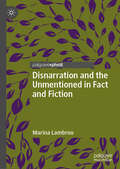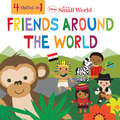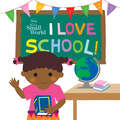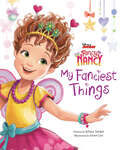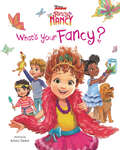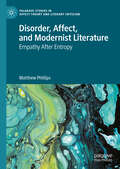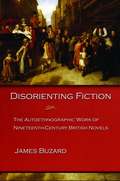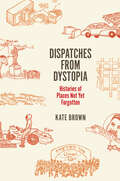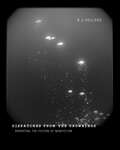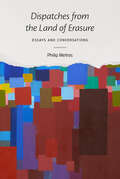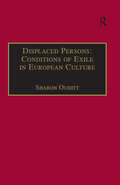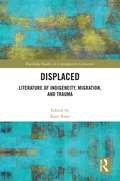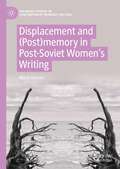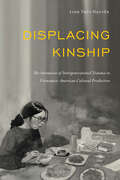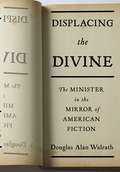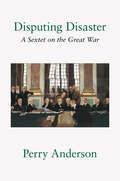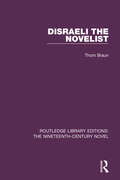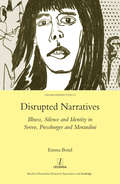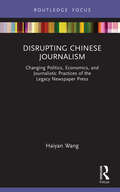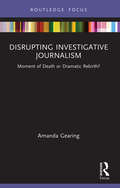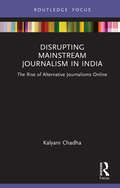- Table View
- List View
Disnarration and the Unmentioned in Fact and Fiction
by Marina LambrouIn this book Marina Lambrou explores the dimension of narrative storytelling described as ‘the disnarrated’ – events that do not happen but which are referred to – across three genres of texts: personal narratives; news stories; and fiction (literary and film). The book begins by asking why such disnarrated narratives are nevertheless considered tellable. It moves on to examine the pervasiveness of this phenomenon in news reports about “near misses” and the shared personal narratives about dangerous experiences, where “truth” is expected to be central their telling. It further discusses how disnarration is generated in counterfactual “what if?” scenarios in fiction where characters follow alternative, forked paths with fascinating unexpected consequences. This engaging work offers original insights to anyone interested in storytelling and will appeal in particular to scholars of language and literature, stylistics, narratology, media, film and journalism.
Disney It's A Small World: Friends Around the World
by Disney PressLearn to say "Hello" and "I Love You" in languages from across the globe and meet animals from many different countries in this colorful book inspired by the Disney theme park attraction!
Disney It's A Small World: I Love School!
by Disney PressWhat if you could spend the morning in China learning about history, then hop on a plane to South Africa for music class? Or maybe you could play tag in Italy at recess, then travel to America and practice spelling! It’s easy to learn and play around the world—just look inside! With new friends Andrew, Ling, Zanele, and Dario, school has never been more fun.
Disney Junior Fancy Nancy: My Fanciest Things (Disney Junior Fancy Nancy)
by Krista TuckerOoh la la! Nancy loves all of the fancy things in her room—like the fabulous tutu she wore at her dance recital, her exquisite tea set, and the magnifique vanity table that once belonged to her grandmother. But Nancy will soon discover that there’s something extra special that Nancy’s fanciest things all have in common…Disney Junior’s Fancy Nancy: My Fanciest Things is a brand-new picture book with gorgeous watercolor art by Grace Lee and a heartwarming original story, based on the animated show and inspired by the classic picture book series.Disney Junior’s Fancy Nancy is an animated family comedy starring six-year-old Nancy, a girl who is fancy in everything from her advanced vocabulary to her creative, elaborate attire. The show is based on the New York Times bestselling book series Fancy Nancy by Jane O’Connor and Robin Preiss Glasser.
Disney Junior Fancy Nancy: What's Your Fancy? (Disney Junior Fancy Nancy)
by Krista TuckerBased on the Disney Junior TV show and inspired by the classic picture book series, this is a brand-new, beautifully illustrated picture book that’s perfect for sharing with the Fancy Nancy fan in your life!Nancy knows that everyone has his or her own way of being fancy. It’s part of what makes us unique. But Nancy is curious to know what makes her family and friends feel fancy, so she goes to find out. Nancy is happy to know that—while she has her own way of being fancy—everyone else does too. These different expressions of fanciness are what make life so magnifique! Disney Junior’s Fancy Nancy is an animated children’s series starring six-year-old Nancy, a girl who is fancy in everything from her advanced vocabulary to her creative, elaborate attire. The show is based on the New York Times bestselling book series Fancy Nancy by Jane O’Connor and illustrated by Robin Preiss Glasser
Disorder, Affect, and Modernist Literature: Empathy After Entropy (Palgrave Studies in Affect Theory and Literary Criticism)
by Matthew PhillipsModernist literature is defined by entropic characteristics. Its common themes include fragmentation, uncertainty, distrust, and misunderstanding. Alongside these themes, however, exists a desire to rebuild, to distill elements of past constructs into something that can provide stability in the chaotic present. Historically, modernist studies has focused on the former, without ample attention given to how entropic circumstances alter human emotion and affect. This book offers a new way of conceptualizing the modernist experience of alienation, disorder, and system deterioration as not merely negative, but productive in facilitating new structures of feeling and social adhesion. It pushes extant literary evaluations of entropy into a new realm by interrogating the human cost of entropic circumstances, and shows that we can use the process of entropy as a metaphorical lens through which to further understand the human connections and shared experiences reflected in modernist literature.
Disorienting Fiction: The Autoethnographic Work of Nineteenth-Century British Novels
by James BuzardThis book gives an ambitious revisionist account of the nineteenth-century British novel and its role in the complex historical process that ultimately gave rise to modern anthropology's concept of culture and its accredited researcher, the Participant Observer. Buzard reads the great nineteenth-century novels of Charles Dickens, Charlotte Brontë, George Eliot, and others as "metropolitan autoethnographies" that began to exercise and test the ethnographic imagination decades in advance of formal modern ethnography--and that did so while focusing on Western European rather than on distant Oriental subjects. Disorienting Fiction shows how English Victorian novels appropriated and anglicized an autoethnographic mode of fiction developed early in the nineteenth century by the Irish authors of the National Tale and, most influentially, by Walter Scott. Buzard demonstrates that whereas the fiction of these non-English British subjects devoted itself to describing and defending (but also inventing) the cultural autonomy of peripheral regions, the English novels that followed them worked to imagine limited and mappable versions of English or British culture in reaction against the potential evacuation of cultural distinctiveness threatened by Britain's own commercial and imperial expansion. These latter novels attempted to forestall the self-incurred liabilities of a nation whose unprecedented reach and power tempted it to universalize and export its own customs, to treat them as simply equivalent to a globally applicable civilization. For many Victorian novelists, a nation facing the prospect of being able to go and to exercise its influence just about anywhere in the world also faced the danger of turning itself into a cultural nowhere. The complex autoethnographic work of nineteenth-century British novels was thus a labor to disorient or de-globalize British national imaginings, and novelists mobilized and freighted with new significance some basic elements of prose narrative in their efforts to write British culture into being. Sure to provoke debate, this book offers a commanding reassessment of a major moment in the history of British literature.
Disowning Knowledge: In Seven Plays of Shakespeare
by Stanley CavellReissued with a new essay on Macbeth this famous collection of essays on Shakespeare's tragedies considers these plays as responses to the crisis of knowledge and the emergence of modern skepticism provoked by the new science of the late sixteenth and early seventeenth centuries.
Dispatches from Dystopia: Histories of Places Not Yet Forgotten
by Kate BrownWhy are Kazakhstan and Montana the same place? asks one chapter of Kate Brown s surprising and unusual journey into the histories of places on the margins, overlooked or erased. It turns out that a ruined mining town in Kazakhstan and Butte, Montana America s largest environmental Superfund site have much more in common than one would think thanks to similarities in climate, hucksterism, and the perseverance of their few hardy inhabitants. Taking readers to these and other unlikely locales, "Dispatches from Dystopia" delves into the very human and sometimes very fraught ways we come to understand a particular place, its people, and its history. In "Dispatches from Dystopia, " Brown wanders the Chernobyl Zone of Alienation, first on the Internet and then in person, to figure out which version the real or the virtual is the actual forgery. She also takes us to the basement of a hotel in Seattle to examine the personal possessions left in storage by Japanese-Americans on their way to internment camps in 1942. In Uman, Ukraine, we hide with Brown in a tree in order to witness the annual male-only Rosh Hashanah celebration of Hasidic Jews. In the Russian southern Urals, she speaks with the citizens of the small city of Kyshtym, where invisible radioactive pollutants have mysteriously blighted lives. Finally, Brown returns home to Elgin, Illinois, in the midwestern industrial rust belt to investigate the rise of rustalgia andthe waysher formative experiences have inspired her obsession with modernist wastelands. "Dispatches from Dystopia" powerfully and movingly narrates the histories of locales that have been silenced, broken, or contaminated. In telling these previously unknown stories, Brown examines the making and unmaking of place, and the lives of the people who remain in the fragile landscapes that are left behind. "
Dispatches from the Drownings: Reporting the Fiction of Nonfiction
by B. J. HollarsDisturbed by stories of drownings in the river behind his home in Eau Claire, Wisconsin, writer B. J. Hollars combed the archives of local newspapers only to discover vast discrepancies in articles about the deaths. In homage to Michael Lesy&’s cult classic, Wisconsin Death Trip, Hollars pairs reports from late nineteenth- and early twentieth-century journalists with fictional versions, creating a hybrid text complete with facts, lies, and a wide range of blurring in between. Charles Van Schaick&’s macabre, staged photographs from the era appear alongside the dispatches, further complicating the messiness of history and the limits of truth.
Dispatches from the Land of Erasure: Essays and Conversations (Poets On Poetry)
by Philip MetresDrawn from a decade of writing and conversations by Arab American poet and writer Philip Metres, Dispatches from the Land of Erasure redefines the writer’s role as a catalyst for justice and a resister of empire. Gathering together a wide range of writing and writers, particularly from Arab and Black diaspora, Dispatches reports on what white imperial culture attempts to erase, while uplifting the voices and people who resist that erasure, offering a vision of a more just and peaceful world. With keen insight into the lived experience of Arab Americans and other historically marginalized communities, the book explores the struggle for a just peace through reading Palestinian Arab and Israeli Jewish writers of conscience who contend with the wall of silence around the issue of Palestine. Further, Dispatches illuminates how to write a poetry of peace and justice, and how poetic activism and activist poets situate themselves in communities seeking change. Divided into four sections—Erasing the Erasures: Writing While Arab, The Poetics of Palestine, The Poetics of Justice, and The Poetics of Peacebuilding—Dispatches weaves personal essays, cultural criticism, group chats, interviews, literary analysis, reviews, and roundtables that include luminaries like Mosab Abu Toha, Hayan Charara, Sahar Khalifeh, Marwa Helal, Erika Meitner, Naomi Shihab Nye, Craig Santos Perez, and M. NourbeSe Philip. Together, the book models the crucial need for robust dialogue to overcome the echo chamber that limits the growth and reach of social movements and to dream of a future beyond the land of erasure.
Displaced Persons: Conditions of Exile in European Culture (Studies in European Cultural Transition #14)
by Sharon OudittThis lively and intellectually vigorous conspectus of studies approaches the subject of exile from a variety of disciplinary perspectives. The contributions to this volume give due attention to the twentieth century migratory phenomena, theorised by Edward Said, Julia Kristeva and Salman Rushdie. They also show that the discourse and experience of exile is not the stuff of modernity alone. The volume illustrates that the waning of the Middle Ages, Reformation and Restoration politics, and the importation of Egyptian mummies into a nineteenth-century England hungry for imperial exotica reveal displacement, dislocation, otherness and the uncanniness of observing strangers-on-display to have long been part of European cultural currency. The essays range across a variety of disciplines: literary studies, modern languages, history of science, philosophy and museum studies.
Displaced: Literature of Indigeneity, Migration, and Trauma (Routledge Studies in Contemporary Literature)
by Kate RoseThrough specific and rigorous analysis of contemporary literary texts, this book shows how writers from inside effected communities portray indigeneity, displacement, and trauma. In a world of increasing global inequality, this study aims to demonstrate how literature, and the study of it, can effect positive social change, notably in the face of global environmental, economic, and social injustice. This collection brings together a diverse and compelling array of voices from academics leading their fields around the world, to pioneer a new approach to literary analysis anchored in engagement with our changing world.
Displacement and (Palgrave Studies in Contemporary Women’s Writing)
by Marja SorvariThe book examines prominent literary works from the past two decades by Russian women writers dealing with the Soviet past. It explores works such as Daniel Stein, Interpreter by Ludmilla Ulitskaya, The Time of Women by Elena Chizhova, Secondhand Time: The Last of the Soviets by Svetlana Alexievich, and In Memory of Memory by Maria Stepanova, and uncovers connecting thematic structures and features. Focusing on the concepts of displacement and postmemory, the book shows how these works have given voice to those on the margins of society and of ‘great history’ whose resistance was often silent. In doing so, these women writers portray the everyday experiences and trauma of displaced women and girls during the second half of the twentieth century. This study offers new insights into the importance of these women writers’ work in creating and preserving cultural memory in post-Soviet Russia.
Displacing Kinship: The Intimacies of Intergenerational Trauma in Vietnamese American Cultural Production (Asian American History & Cultu)
by Linh Thuy NguyenNearly fifty years after the end of the war in Vietnam, American children of Vietnamese refugees continue to process the meanings of the war and its consequences through creative work. Displacing Kinship examines how Vietnamese American cultural productions register lived experiences of racism in their depictions of family life and marginalization. Second-generation texts illustrate how the children of refugees from Vietnam are haunted by trauma and a violent, ever-present, but mostly unarticulated past. Linh Thủy Nguyễn's analysis reveals that present experiences of economic insecurity and racism also shape these narratives of familial loss. Developing a theory of intergenerational trauma, Nguyễn rethinks how U.S. imperialism, the discourse of communism, and assimilation impacted families across generations. Through ethnic studies and feminist and queer-of-color critique, Displacing Kinship offers a critical approach for reading family tensions and interpersonal conflict as affective investments informed by the material, structural conditions of white supremacy and racial capitalism.
Displacing The Divine: The Minister in the Mirror of American Fiction
by Douglas Alan WalrathAs religious leaders, ministers are often assumed to embody the faith of the institution they represent. As cultural symbols, they reflect subtle changes in society and belief-specifically people's perception of God and the evolving role of the church. For more than forty years, Douglas Alan Walrath has tracked changing patterns of belief and church participation in American society, and his research has revealed a particularly fascinating trend: portrayals of ministers in American fiction mirror changing perceptions of the Protestant church and a Protestant God. From the novels of Harriet Beecher Stowe, who portrays ministers as faithful Calvinists, to the works of Herman Melville, who challenges Calvinism to its very core, Walrath considers a variety of fictional ministers, including Garrison Keillor's Lake Woebegon Lutherans and Gail Godwin's women clergy. He identifies a range of types: religious misfits, harsh Puritans, incorrigible scoundrels, secular businessmen, perpetrators of oppression, victims of belief, prudent believers, phony preachers, reactionaries, and social activists. He concludes with the modern legacy of nineteenth- and early-twentieth-century images of ministers, which highlights the ongoing challenges that skepticism, secularization, and science have brought to today's religious leaders and fictional counterparts. Displacing the Divine offers a novel encounter with social change, giving the reader access, through the intimacy and humanity of literature, to the evolving character of an American tradition.
Displacing the Divine: The Minister in the Mirror of American Fiction (Religion and American Culture)
by Douglas WalrathAs religious leaders, ministers are often assumed to embody the faith of the institution they represent. As cultural symbols, they reflect subtle changes in society and belief-specifically people's perception of God and the evolving role of the church. For more than forty years, Douglas Alan Walrath has tracked changing patterns of belief and church participation in American society, and his research has revealed a particularly fascinating trend: portrayals of ministers in American fiction mirror changing perceptions of the Protestant church and a Protestant God.From the novels of Harriet Beecher Stowe, who portrays ministers as faithful Calvinists, to the works of Herman Melville, who challenges Calvinism to its very core, Walrath considers a variety of fictional ministers, including Garrison Keillor's Lake Woebegon Lutherans and Gail Godwin's women clergy. He identifies a range of types: religious misfits, harsh Puritans, incorrigible scoundrels, secular businessmen, perpetrators of oppression, victims of belief, prudent believers, phony preachers, reactionaries, and social activists. He concludes with the modern legacy of nineteenth- and early-twentieth-century images of ministers, which highlights the ongoing challenges that skepticism, secularization, and science have brought to today's religious leaders and fictional counterparts. Displacing the Divine offers a novel encounter with social change, giving the reader access, through the intimacy and humanity of literature, to the evolving character of an American tradition.
Displaying Women: Spectacles of Leisure in Edith Wharton's New York
by Maureen E. MontgomeryFrom the book: "The subject of this book is the public world of New York society women. It covers various aspects of women's lives at the turn of the century in terms of how they negotiated the larger transformation of American culture and society, as well as in terms of the intersection of class and gender interests. In particular, it explores how women's appearance and activities signified leisure with the express intention of laying claim to high social status, and how these women were, in turn, represented in the dominant discourses of journalism and etiquette. This study therefore seeks to make explicit the diverse meanings ascribed to New York society women's activities at the turn of the century in shaping and defining an upper-class identity. Leisure is the key to this upper- class identity precisely because it was an important marker of class."
Disputing Disaster: A Sextet on the Great War
by Perry AndersonA group portrait of six of the finest historians of the First World WarIn Disputing Disaster, Perry Anderson picks out from the highly charged historiography on the First World War one leading historian from each of the major powers that survived the conflagration: Fritz Fischer, famous historian of German war guilt; Pierre Renouvin, a disabled serviceman and preeminent authority on the conflict in France; Luigi Albertini, the Italian newspaper tycoon who, unique among scholars of the Great War, played a part in pitching his country into it; Paul W. Schroeder, the American expert on the system of Europe - an interstate relations and its breakdown in 1914; Keith Wilson, the one radical deviant from a patriotic consensus about Britain&’s role in the outbreak of the fighting; and, from Australia (summoned into the war as a dominion), Christopher Clark, acclaimed author of The Sleepwalkers.Disputing Disaster offers a compelling analysis of the major competing versions of the genesis of the Great War; fresh light on the political background of its leading historians; and a novel synthesis of the determining pressures that brought the conflict to pass.Perry Anderson is emeritus in History at UCLA, and an editor at New Left Review. Recent work: Different Speeds, Same Furies, a comparative study of Anthony Powell and Marcel Proust.
Disraeli
by Robert P. O'KellWhen we think of Benjamin Disraeli (1804-81), one of two images inevitably first springs to mind: either Disraeli the two-time prime minister of Britain, or Disraeli the author of major novels such as Coningsby, Sybil, and Endymion. But were these two sides of his persona entirely separate? After all, the recurring fantasy structures in Disraeli's fictions bear a striking similarity to the imaginative ways in which he shaped his political career.Disraeli: The Romance of Politics provides a remarkable biographical portrait of Disraeli as both a statesman and a storyteller. Drawing extensively on Disraeli's published letters and speeches, as well as on archival sources in the United Kingdom, Robert O'Kell illuminates the intimate, symbiotic relationship between his fiction and his politics. His investigation shines new light on all of Disraeli's novels, his two governments, his imperialism, and his handling of the Irish Church Disestablishment Crisis of 1868 and the Eastern Question in the 1870s.
Disraeli the Novelist (Routledge Library Editions: The Nineteenth-Century Novel #3)
by Thom BraunFirst published in 1981, this book attempts to approach a better understanding of Disraeli the man through his life as a novelist. It is not a series of literary criticisms, rather an attempt to see how ‘fiction’ and the act of ‘fictionalising’ played an important part in Disraeli’s life. The author discusses how Disraeli’s novels in terms of how they reflected various stages of his life and development while assuming no knowledge of the, now mostly out-of-print, books on the part of the reader. This book fills the gap between the standard and comprehensive political biographies and the few literary analyses that appeared the twenty years prior to its publication.
Disrupted Narratives: Illness, Silence and Identity in Svevo, Pressburger and Morandini
by Emma BondIf Madame Bovary's death in Flaubert's 1857 novel marked the definitive end of the Romantic vision of literary disease, then the advent of psychoanalysis less than half a century later heralded an entirely new set of implications for literature dealing with illness. The theorization of a potential unconscious double (capable of expressing the body, and thus also the intimate damage caused by disease) in turn suggested a capacity to subvert or destabilize the text, exposing the main thread of the narrative to be unreliable or self-conscious. Indeed, the authors examined in this study (Italo Svevo (1861-1928), Giorgio Pressburger (1937-) and Giuliana Morandini (1938-)) all make use of individual 'infected' or suppressed voices within their texts which unfold through illness to cast doubt on a more (conventionally) dominant narrative standpoint. Applying the theories of Freud and more recent writings by Julia Kristeva, Bond offers a new critical reading of the literary function of illness, a function related to the very nature of narration itself.
Disrupting Chinese Journalism: Changing Politics, Economics, and Journalistic Practices of the Legacy Newspaper Press (Disruptions)
by Haiyan WangDisrupting Chinese Journalism provides a rich insight into the disruptive effects of digital technologies – especially smart-phones – on the Chinese print media market. Pulling from an extensive corpus of original research, including 191 face-to-face interviews with managers and journalists, and a content analysis of some 4,000 news reports, Haiyan Wang examines how Chinese legacy newspapers have responded to the changing digital media environment, including by adapting their organizational structures, revenue models, and journalistic practices. This book also points to how the government has taken a more interventionist stance on editorial content, and how this has further complicated the digital transitions of the Chinese media. This book is an invaluable resource for students of media studies, journalism, Chinese area studies, and digital technology.
Disrupting Investigative Journalism: Moment of Death or Dramatic Rebirth? (Disruptions)
by Amanda GearingThis book makes the case for the enormous potential embodied in investigative journalism if reporters collaborate in the digital sphere and engage with emerging techniques and technologies. Bringing together personal narratives from investigative journalists who have successfully found, verified and published stories using social media platforms and Web based communications, Disrupting Investigative Journalism explores the risks and benefits that come from this kind of digital collaboration. Citing how digital connection has enabled reporters around the world to form the International Consortium of Investigative Journalists, which in turn led to such global news sensations as the Panama Papers and the Paradise Papers, this book makes a practical argument for how the daily work of investigative journalism can change to capture enormous latent potential. This is a valuable text for students and scholars in the fields of investigative journalism, media and digital communication.
Disrupting Mainstream Journalism in India: The Rise of Alternative Journalisms Online (ISSN)
by Kalyani ChadhaDisrupting Mainstream Journalism in India offers a comprehensive and empirically-grounded analysis of the production of digital journalism by marginalized groups within Indian society.Drawing on in-depth interviews with practitioners as well as samples of news content, the author critically examines the way in which varied forms of digital alternative journalism provide socially, economically and politically disadvantaged groups with new and unprecedented opportunities to express their own perspectives, as well as offering alternatives to the hegemony of mainstream news narratives. These marginalized groups include women, Dalits and Muslims whose voices tend to be erased or misrepresented within the public sphere. By exploring these disruptions, Chadha offers insight into not only into the new media landscape of India but also its implications for journalism and democracy at large.Disrupting Mainstream Journalism in India is a valuable empirical resource for students and scholars interested in Indian media, journalism and democracy.
